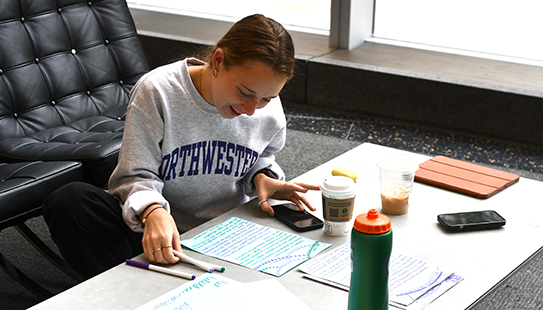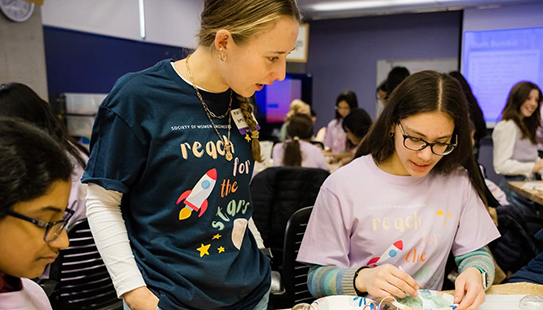Grad Spotlight: How Marilene van den Berg Turned Connection Into Innovation
van den Berg is graduating with a degree in biomedical engineering
As she approaches her graduation from Northwestern Engineering, Marilene van den Berg has some advice for current and future McCormick students:
Have fun and enjoy it.

“It's true; these four years are over faster than you can imagine, so take advantage of every opportunity and say yes,” van den Berg said. “That said, Northwestern Engineering can be challenging, so go easy on yourself and know that things will work themselves out – having the right mindset is everything.”
van den Berg followed her own advice.
While she majored in biomedical engineering, van den Berg held leadership roles within the Society of Women Engineers (SWE) and the McCormick Student Advisory Board (MSAB), spearheading initiatives to improve student-faculty relations and supporting student well-being. Additionally, her research in biomedical engineering, mentorship roles, and tutoring experiences have deepened her passion for fostering community, advancing medical innovations, and supporting students academically and personally.
van den Berg will begin working in August in the medical device and research industry after a summer of travel to southeast Asia with friends and a trip to see family in the Netherlands. She reflected on her time at the McCormick School of Engineering in a Q&A.
Why did you decide to pursue engineering at Northwestern?
I've always been a curious person, always needing to know the why and how. I decided to pursue engineering because I knew it could teach me how to think and try to answer those questions. I've always loved science and math, so engineering felt like a natural fit, offering a way to apply those subjects in a meaningful, real-world way. I've always had an interest in the medical field as well, so biomedical engineering was the perfect blend to let me explore how to make an impact in that field.
How did the McCormick curriculum help build a balanced, whole-brain ecosystem around your studies in your major? Any course highlights you'd like to share?
The McCormick curriculum's emphasis on a holistic approach to engineering has been pivotal in my four years. Starting with Design Thinking and Communication in my first year, I was taught how to properly approach an engineering design problem and how to work with others. I learned the importance of working with individuals with different experiences and backgrounds. Engineering Analysis was a tough but great introduction to engineering and provided a lot of critical analytical skills I applied later on in my BME courses. I think the McCormick curriculum provides a lot of space to be creative and pursue your interests, which I took advantage of as well.
How did your work with SWE and the MSAB impact your time at McCormick? And what did it mean to your development as a student and researcher?
My time with SWE and MSAB was some of the most fulfilling work I've gotten to do. I came to Northwestern because of its emphasis on community in engineering, and on the importance of creating space for different identities, especially women engineers. I had the privilege of working with lots of other amazing McCormick student leaders who also wanted to foster a better community among McCormick students, mentor younger students as they navigated a big life change, and work with faculty to address students’ concerns or wishes, to name a few things.
From volunteering at events to encouraging young women to pursue engineering to creating events for Northwestern engineers to meet each other and hang out, I had the chance to work with so many talented and kind engineers that allowed for a lot of really impactful events to come true. It's been a great chance to give back to a community that has done so much for me.


What skills or knowledge did you learn in the undergraduate program that you think will stay with you for a lifetime?
I learned a lot in my four years here, but I would say the most important was learning how to problem-solve through collaboration. I learned how to solve problems and think quickly under pressure or other constraints, and I think that mindset will benefit me in all aspects of life, not just in solving engineering problems. I also got to experience how to collaborate with others and how important it is to work with people who have unique backgrounds or experiences; knowing how to utilize everyone's strengths and specialties for the best outcome is something that will always be important.
Most importantly, though, I learned what it means to fail, and how to handle it and grow from it. Engineering and research can be hard (and so can a lot of things in life) and that means you won't always succeed or things might not go according to plan; but the important thing is learning from it and getting the chance to be comfortable with failure by not seeing it as such a bad thing, rather as a sign that you're trying.
What are your long-term plans?
I'm hoping to apply my engineering skills to help with the research and development of medical devices and therapeutics for global health applications to improve healthcare accessibility.
Is there anything else you’d like to discuss about your Northwestern experience?
I'm incredibly grateful for my four years here and would not have changed a thing about my experience – this community and the lifelong friendships I've made here have meant everything to me and is the reason I am so sad to go. Go Cats!
Editor's Note: This is the final in a series of Q&As with graduating Northwestern Engineering students leading up to the June 16 Undergraduate Convocation. Read the prior reflections here: